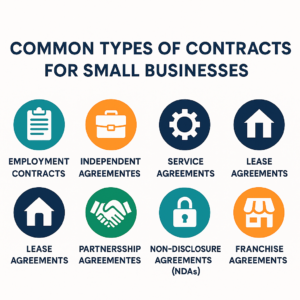
Running a small business involves much more than delivering a great product or service. Legal responsibilities, especially around contracts, can have a huge impact on your operations and financial stability. Whether you’re hiring an employee, signing a lease, or working with vendors, having a solid understanding of contract law helps protect your business and ensures fair dealings.
This blog is a part of our Service In-House Legal Solutions
In this blog, we’ll explore the basics of contract law every small business owner should know—what makes a contract legally binding, the types of contracts you’ll commonly encounter, and the key legal principles to be aware of.
Why Small Businesses Need Contracts
Many small business owners operate on trust and verbal agreements, especially in the early stages. However, verbal agreements can easily lead to misunderstandings or legal disputes down the road. Written contracts help define roles, expectations, and legal rights for all parties involved.
Understanding contract law empowers you to create better agreements, avoid legal issues, and resolve disputes more efficiently. It’s a key element of running a legally sound and successful small business.
Common Types of Contracts for Small Businesses
Contracts play a critical role in keeping a small business organized, professional, and legally secure. Depending on your operations, you may need various contracts to manage clients, employees, and vendors. Here are the most common types of contracts small business owners should know:

Employment Contracts
These outline the rights and responsibilities of both the employer and the employee, including job duties, working hours, salary, benefits, leave policies, and termination clauses.
Small business owners benefit from employment contracts by ensuring compliance with labor laws and protecting themselves from potential lawsuits or disputes.
Independent Contractor Agreements
Used when hiring freelancers or consultants, these contracts define the scope of work, deadlines, payment structure, and ownership of work produced.
They help small businesses avoid misclassification issues and clarify that the worker is not an employee.
Service Agreements
If you hire external service providers—like marketing agencies, IT support, or janitorial services—this contract sets expectations, timelines, and payment terms.
Clear service agreements prevent misunderstandings and help your small business maintain quality standards.
Sales and Purchase Agreements
Whether you’re buying or selling goods, these contracts define product details, prices, delivery terms, warranties, and return policies.
Lease Agreements
Most brick-and-mortar small businesses lease commercial space or equipment. Lease contracts define rental amounts, terms, usage rights, and maintenance responsibilities.
A strong lease agreement protects you from hidden fees and ensures clarity with landlords.
Partnership Agreements
If your small business is a joint venture, a partnership agreement outlines ownership shares, roles, profit distribution, and procedures for dispute resolution or dissolution.
Having this in writing prevents potential conflict and provides a legal structure for smooth collaboration.
Non-Disclosure Agreements (NDAs)
NDAs protect your confidential business information when working with employees, contractors, or collaborators. They prevent sensitive information from being shared with competitors or the public.
For a small business developing new products or strategies, NDAs are essential.
Franchise Agreements
If you run a franchise or plan to buy one, this contract defines rights and obligations between franchisor and franchisee, including branding, fees, operations, and training support.
Franchise agreements are legally complex and should always be reviewed by a business lawyer.
Vendor and Supplier Agreements
These contracts help maintain reliable relationships with vendors and suppliers. They specify delivery schedules, pricing, payment terms, and what happens in case of delays or product issues.
For a small business, this ensures supply chain stability and consistency.
Essential Elements of a Contract
To be legally valid and enforceable, a contract must include the following:
Offer
One party must present clear terms for an agreement.
Acceptance
The other party must agree to those terms without conditions. If they propose changes, it’s a counteroffer.
Consideration
Each party must exchange something of value (e.g., services, money, goods).
Mutual Consent
Both parties must willingly agree to the terms, free from coercion or misrepresentation.
Legal Purpose
The contract must be for lawful activities. Anything illegal automatically voids the agreement.
Capacity
Both parties must have the legal capacity to enter a contract—typically meaning they’re of sound mind and legal age.
Missing any of these elements could render your small business contract invalid or unenforceable.
What Are the Basic Concepts of Contract Law?
Understanding key legal principles helps you navigate contracts with confidence:
Breach of Contract
When one party fails to fulfill their contractual obligations, it’s called a breach. The other party may seek damages, enforcement, or contract termination.
Remedies
If a contract is breached, legal remedies include financial compensation, cancellation, or court-ordered performance of duties.
Written vs. Oral Contracts
While oral agreements can be legally binding, they’re difficult to prove. Small businesses should always aim for written contracts.
Void vs. Voidable Contracts
A void contract is legally invalid from the start. A voidable contract starts valid but can be canceled under certain conditions, like fraud or misrepresentation.
Get a simple explanation of business law from Khan Academy or explore online courses via Coursera.
Contract Interpretation
In disputes, courts interpret unclear terms based on the parties’ intent. That’s why it’s essential to draft contracts with precise and unambiguous language.
Contract Tips for Small Businesses
Always read the fine print before signing any agreement.
Use templates, but customize them to suit your specific business needs.
Consult an attorney for complex or high-value contracts.
Store your contracts securely and review them regularly.
Keep communication professional and documented when negotiating or resolving contract-related issues.
For contract templates and basic legal help, explore FindLaw’s Small Business Center.
Contracts are a vital tool for every small business owner. They provide structure, reduce risks, and offer legal protection in case things go wrong. Whether you’re forming a partnership, hiring a freelancer, or signing a lease, understanding contract law helps you make informed decisions and run your small business with confidence.
By mastering these principles and using the right types of contracts, you’ll lay a strong legal foundation for long-term business success. For expert legal support tailored to entrepreneurs and startups, check out LawGig—a trusted resource for small business legal guidance and contract solutions.
Rinu Ann George is an SEO Analyst at Upgraderz,Specializing in Search Engine Optimization,Content Strategy and Digital Visibility.

Awesome https://rb.gy/4gq2o4